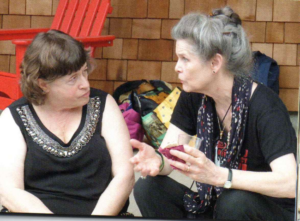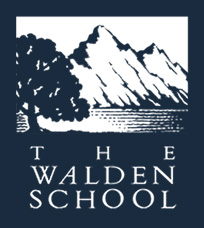In the Spotlight
Amy Catlin-Jairazbhoy

Amy is a Junior Conservatory Camp (JCC) alumna with deep ties to Grace Cushman and her teachings. She is also a donor to Walden who carries herself with a lively and passionate spirit that shines through her research, teaching, music, and everything she does.
Learn more about her work at Apsara Media, and read her full biography on UCLA’s website.
How and when did your relationship with the Junior Conservatory Camp (JCC) begin?
My piano teacher in Montgomery County would take me with her every Saturday to Peabody Preparatory; we would take Musicianship classes with Grace Cushman together. Within two years I was teaching my piano teachers’ students musicianship as well.
This naturally led to attending the Junior Conservatory Camp for two years, then coming three more years as a faculty member.
In my last two years of high school I studied Bharatanatyam classical dance of South India with Georgia Cushman (one of Grace Cushman’s two daughters) in Baltimore. She had just come back from Madras, India (which is Chennai today), where she had studied at Kalakshetra. I was a devoted student, but it’s very difficult when you start at 16 years old! That Indian connection was one reason I went to India as a graduate student. I chose college instead of staying at the Conservatory, because I wanted to know more about the rest of the world, especially during the Vietnam War years.
Could you describe a favorite memory from your time at JCC?
I have an aversion to favorites . . . it seems that you are ranking things. I have many favorite memories. The composer forums were stupendous. The performances were breathtaking. To have my own compositions performed—a Robert Frost poem that I set for piano and violin, performed by soprano Shari Fleming. It was the second time I heard my own composition performed.
Also, singing in some of Humphrey Evans’ compositions. He was a great inspiration and in my cohort of students. He was a close friend until his last days. He was a genius and iconoclastic, funny, witty. We used to play ping pong together at camp!
What is something from JCC that you have carried with you?
How to improvise with the material you’re learning in musicianship. How to make creative use of the knowledge that you acquire was the main teaching that Grace taught all of us. To use what you’ve learned: if you’re just learning facts, you’re not making use of it, and you’re not using it creatively. That’s what I’ve done with my scholarship also. I try to use it in creative ways, applying music research to address community problems, both in India among underserved communities and here (in the US) with refugees from Southeast Asia: Hmong tribal refugees from Laos and Khmer refugees from the killing fields of Cambodia.
It’s so deep. It’s so fundamental, the methods that Grace used—not to mention her enthusiasm and her passion!
Mrs. Cushman taught me how to plan a lesson and how to evaluate a lesson after you’ve taught it. She was very aware of each student’s needs, backgrounds, disabilities, insecurities. I still do that—I plan my lectures; I write out every word when I teach now, and afterwards review every line of what I did and what I added. I keep in touch with as many students as I can; it’s been born into me because of Grace.
How are music and/or creativity part of your life now?
I’ve been teaching one course at UCLA for the past 10 years. It’s not about classical folk music of India, not about music of the sacred (all topics I taught with my applied work in ethnomusicology); it is called “Music of Bollywood and Beyond.” It covers 100 years: from silent films to the present. This history of cinema and music relates deeply to the history and the people of India. I tell my students, most of whom are of Indian heritage, that “you can talk to your grandparents about this.” They come back and say they’ve had the best conversations with their grandparents and parents . . . it bridges the generational gap. Suddenly you have something to share that you both love.
I teach in an applied sort of way. I design the courses myself, and the students are the subjects. We have some great discussions about how films composed 50 years ago might relate to today, about whether they were created before or after independence. It gives it a historical foundation to talk about the films, and the music, and the influence of Western music and jazz.
I also still play the piano. I like to improvise in an Indo-Jazz fusion style which I do sometimes with a partner who plays the saxophone. I’ve taught him how to improvise in different Ragas (singular Indian Raga), especially one raga that my husband called a “hypothetical” raga because it never occurred, but it should have. It uses the pentatonic (all black keys) with C (tonic) and G (dominant).
What is a non-musical hobby that’s part of your life?
Ping pong! It’s a great game for musicians. We have an outdoor ping pong “stadium” in our home. It’s very good for hand-eye coordination. It’s the fastest game there is, good for mental & physical agility. Great for elders, as the sudden movements are good for preventing Alzheimer’s.
I also love to dance: couple dancing, or ballroom dancing and Middle Eastern dance. Coordinating with the music is so important—and so good for the brain. I also exercise at the gym on the elliptical trainer while watching the news. I watch Indian news every day on three different channels.
Why do you give to Walden?
Transformation.
When I went to the Peabody, I was teaching there in my Junior and Senior years of high school. In fact, I had left home.
She [Grace Cushman] made it possible for me to leave by getting me this job as a live-in cook and babysitter for the six children of the Rector of St. Paul’s cathedral. So, I could afford to leave Chicago where my parents had moved, which I hated! I was able stay on in Baltimore after camp.
See what a difference this made in my life? It made me independent from the time I was 16 . . . I didn’t see my parents for two years. I’m telling you: she transformed my life. I owe my life to her. So, when you ask why do I give to Walden? That’s why. The transformation of my life.
What hope do you have for Walden’s future?
I would love to see a connection with NPR’s “From the Top,” and to see more international scope, incorporating music from different cultures!
